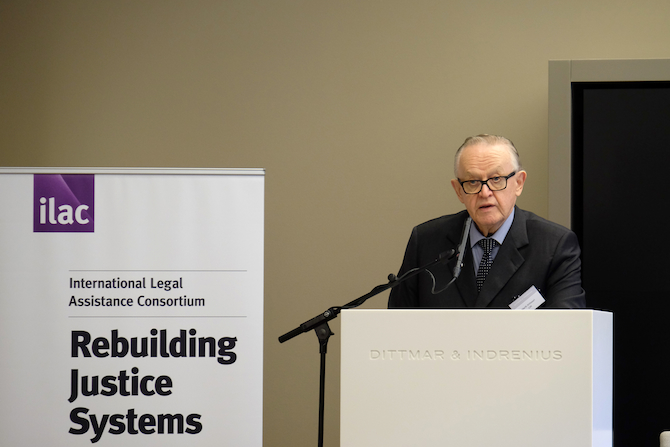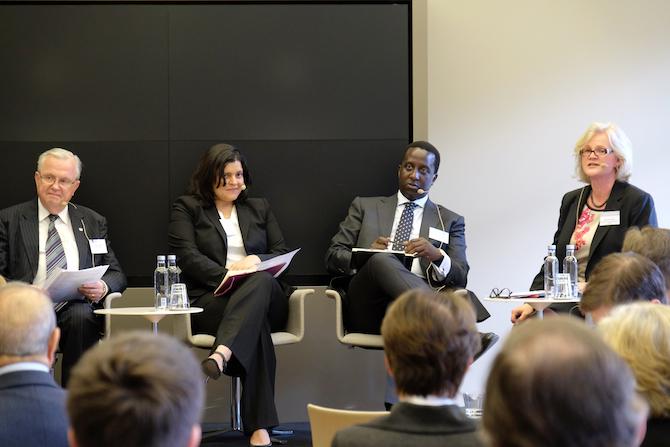“Listen to people” – No one-size-fits-all approach to justice in conflict resolution
What is a mediator’s perspective to justice? How should memory and identity be taken into account in judicial processes? What are some of the key lessons drawn from different conflict contexts?
Spring light was pouring in from the wide windows in the premises of Dittmar & Indrenius while a group of international lawyers and CMI experts listened to the distinguished panel speakers ponder these questions.

President Martti Ahtisaari opened the seminar on peace mediation and justice. (Photo: Niko Vartiainen)
Mediator’s perspective
President Martti Ahtisaari reflected the seminar’s theme from a mediator’s perspective in his keynote speech. “The ending of a violent war by agreement between conflicting parties means often that a deal is made between several leaders with blood on their hands,” he reminded the listeners.
The Nobel laureate highlighted the two obligations that a mediator has when negotiations are taking place. They concern past atrocities and accountability.
“The first is to prevent reoccurrence of the problem that caused the conflict in the first place and to make sure that atrocities will not continue. The second is to lay the foundations for reconciliation and strategic peace building process,” Ahtisaari said.

Members of the panel were Hans Corell, former UN diplomate and ambassador; Sareta Ashraph, UK Barrister and Analyst on the UN Commissions of Inquiry on violations of international law in the conflicts in Syria and Libya; and Itonde Kakoma, head of CMI’s Sub Saharan Africa team. The panel was moderated by Nina Nordström, director of Finnish Ministry for Foreign Affairs’ human rights policy unit.
Questions of identity and memory
Itonde Kakoma, CMI Head of Sub-Saharan Africa and former rapporteur of the Liberian Truth and Reconciliation Commission, reminded about the need to have a critical look at the question of identity while addressing issues of justice.
“Who in the Liberian context, was not a perpetrator? Who, in the Liberian context, was not a victim?”
The participants highlighted that from an individual’s point of view, making judicial processes predictable is extremely important: people need to know what to expect.
On the other hand, recording memory and history as part of justice processes is equally important.
“We must remember that also memory, just like justice, is deeply political,” reminded Kakoma.
No one-size-fits-all approach to justice
There is no doubt about the key message that prevailed throughout the seminar: there is no one-size-fits-all approach to justice.
Hans Corell, former United Nations diplomat and a seasoned justice expert, highlighted that we need to listen to the context-specific needs.
“In Cambodia, for example, people were not interested in setting a court for the perpetrators but wanted only to know what happened to their near and dear ones. One of the key lessons I’ve learned throughout the years is simple: listen to people”.
The seminar was organized in collaboration with ILAC (International Legal Assistance Consortium) and hosted by Dittmar and Indrenius. The event was organized as part of CMI’s 15th anniversary celebrations.
CMI / Suvi Tuuli